
In this edition of “I Wake Up Streaming,” novelist William Boyle rounds up his top streaming picks for the month of November. The column’s name is a play on the 1941 film I Wake Up Screaming, starring Betty Grable, Victor Mature, and Carole Landis. While the film’s title hits a pleasing note of terror and despair, changing that one letter speaks to the joy of discovering new films and rediscovering old favorites, as well as the panic that comes with being overwhelmed by options.
Sonny Boy (Prime Video and Tubi)
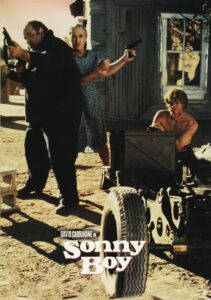
I was looking through the great Brad Dourif’s filmography and stumbled across Sonny Boy from 1989, written by Graeme Whifler (Dr. Giggles) and directed by Robert Martin Carroll. It’s weird and wild as hell. In the fictional town of Harmony, New Mexico, Dourif’s character Weasel kills a couple at a roadside motel and steals their Lincoln Continental to bring back to crime boss Slue (Paul L. Smith, Bluto from Robert Altman’s Popeye), not realizing there’s a baby in the backseat. Slue’s wife Pearl (David Carradine, who also sings the film’s theme song, playing a trans character who feels way ahead of her time) wants to keep the baby. Eventually, Slue gives in, deciding he can teach the kid to be a killer. The child, now named Sonny Boy, is raised like a wild creature, chained up, dirty—when he’s six, Slue cuts his tongue out and he doesn’t even cry. As Sonny Boy gets older, his narrative arc comes to resemble more and more that of Frankenstein’s monster. Brad Dourif called the film “a heavy metal fable.” There are echoes of Sam Peckinpah, Terrence Malick, Raising Arizona, and The Texas Chainsaw Massacre. I was also put in mind of the Big Tuna section of Wild at Heart (which was released after this). Paul L. Smith’s got the most intensely hairy ears I’ve ever seen. Won’t stop thinking about this one any time soon. Amazing that it even exists.
No Way Home (Prime Video)
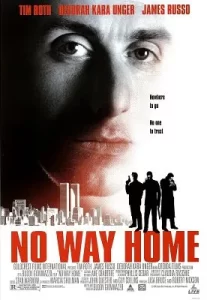
Can’t believe I’d never seen this before now. A grim little ’90s B neonoir set on Staten Island starring Tim Roth, Deborah Kara Unger, and James Russo. Buddy Giovinazzo’s follow-up to his Taxi Driver-meets-Eraserhead 1986 cult film Combat Shock (also streaming on Prime). Roth plays Joey Larabito, who gets out of prison after doing time on a murder rap and returns to his childhood home on Staten Island, now occupied solely by his brother Tommy (Russo) and Tommy’s surprise wife, Lorraine (Unger). Joey’s trying to live right, and it doesn’t take much time to see it’s Tommy who’s the real source of trouble. Joey’s haunted by the ghosts of all he lost when he went away to prison and by an accident that happened when he was a kid, causing lasting damage. It’s interesting to hold this up against Little Odessa, which is also about brothers—Roth crossing the bridge to Staten Island here and playing a character that’s closer to Edward Furlong’s Reuben, while Tommy is more like Roth’s Joshua in James Gray’s masterful debut. I kind of love Roth in New York City mode—it never makes a lot of sense, but it works. His slouch, his swagger, that accent. Unger’s performance is freighted with sadness—there’s not a lot to her character, but she adds depth with expressions and intonations. Russo is always compelling—just such a creepy, wild, spidery energy. The dialogue is a little by-the-book, stilted and stale maybe, but the real draw is the look of the film. The spaces the characters inhabit are perfect, especially the Larabito house, with its decaying grandeur. The peeling linoleum. The lace tablecloth. The religious statues. The rotary phone. The skeezy stove. The percolator. So many killer details—the house itself tells such a rich story. And the location shooting brings the whole thing fully to life—Staten Island in the ’90s captured with its weed-strewn sidewalks and graffiti and ragged houses and pizzerias with dirty windows and junkyards and bridges. The film builds to a brutal and satisfying climax.
Studs Lonigan (YouTube)
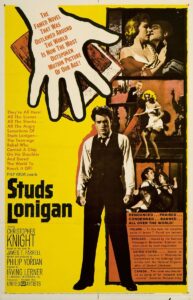
James T. Farrell’s Studs Lonigan book trilogy was formative as hell for me. I’m surprised I’d never watched this 1960 adaptation before. A lot of dipshit reviews for it on Letterboxd—mostly folks who are only coming to it because it’s an early entry in Jack Nicholson’s filmography. Instead, go read Pauline Kael on it. She calls it “an honorable low-budget effort by a group of people trying to break the Hollywood molds, and there are a few passages of daring editing that indicate what the film was aiming for [. . .]: an underfinanced American attempt at I Vitelloni.” I don’t want to oversell it, but it’s ambitious, inventive, and—I say this as a devout Farrell fan—definitely worth watching. Director Irving Lerner made the excellent Murder by Contract (currently streaming on the Criterion Channel as part of its Columbia Noir retrospective) a couple of years before this and was no doubt trying to do something new and fresh, which is probably why it didn’t land for audiences in 1960. It feels ahead of its time in so many ways, even if it’s a bit choppy and hectic. Kael suggested Christopher Knight was miscast as Studs—that Nicholson as Weary Reilly and Frank Gorshin as Kenny Killarney are the true standouts—but I quite liked Knight’s understated performance, and I also think Venetia Stevenson (Lucy Scanlon), Carolyn Craig (Catherine Branahan), and Helen Westcott (Miss Julia Miller) are all striking and memorable in their roles. A truly gorgeous-looking movie. Lerner did an awful lot with an obviously small budget—he and cinematographer Jockey Arthur Feindel (interesting to note he also shot Edgar G. Ulmer’s Bluebeard because I thought of Ulmer’s style more than once) are using constraints to their advantage. Lots of stunning shadows and interesting use of spaces. Some adventurous angles and editing choices. The movie feels wild like life, thrumming with darkness and dread and possibility. I could be wrong, but I think I see the seeds of The Graduate here—some of what this movie’s gunning for, Mike Nichols nailed seven years later when the language of American film had been altered more drastically.
Palookaville (YouTube)
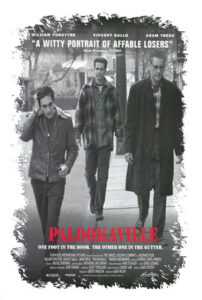
Hadn’t seen this since the VHS days. Such an underrated (and all but forgotten, as far as I can tell) gem. A quintessential ’90s crime comedy about a bunch of chumps trying to pull a heist. Hilarious and full of heart. Incredible cast—Vincent Gallo, William Forsythe, Frances McDormand, young Kim Dickens, LisaGay Hamilton, Adam Trese, and the great Suzanne Shepherd. The debut of Alan Taylor, who directed episodes of The Sopranos, Homicide: Life on the Street, and Deadwood and many other shows, as well as—more recently—The Many Saints of Newark. Based on some Italo Calvino stories. Really deserves to be rediscovered and deserves a nice Blu-ray release (I think it did get a DVD way back, but it’s out of print). It’s on YouTube—the quality isn’t great but it’s the only way to see it right now.
Kendra and Beth (Prime Video)
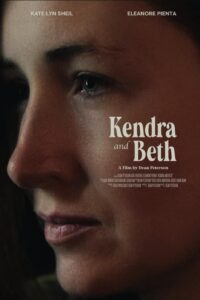
I love Kate Lyn Sheil, so I’m surprised I hadn’t heard anything about Dean Peterson’s 2021 film Kendra and Beth. I was looking through Sheil’s filmography, noticed this and saw it was on Prime Video, and knew right out of the gate it was up my alley. A sad, strange little comedy that genuinely made me laugh my ass off at least a dozen times. Might be Kate Lyn Sheil’s best (and funniest) performance, but Eleanore Pienta (who I’d never seen in anything before) was also a huge revelation, and Whitmer Thomas gets some of the best lines. Eighty perfect minutes. Goofy as hell. And sweet. Feels very much like a small ’90s movie in the best ways. Also reminded me of Lynn Shelton. Some stuff I won’t stop thinking about: That Julia Roberts VHS collection; Beth’s pesto pasta habit; this exchange between Kendra and Beth: “I was supposably the first baby to ever send an email.” “How does a baby send an email?”; “sausage messages”; the whole Michael Clayton thing; Lego dad; “We’re watching Larry Crowne . . .”
Les Scélérats aka The Wretches (rarefilmm.com)
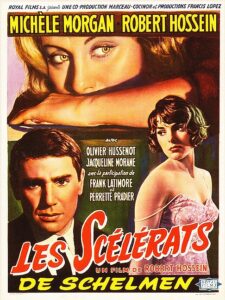
Until Elric Kane recommended it on a recent episode of Pure Cinema Podcast, I had no idea that this 1960 Robert Hossein adaptation of one of my favorite Frédéric Dard novels even existed. The novel is published in English as Crush. The film is called Les Scélérats (also the title for the original French publication), aka The Wretches, and it’s a provocative, melancholy, and moody noir melodrama that really captures the tone and feeling of the book. A young French woman starts to work as a maid for an American couple in free fall after the death of their son; needless to say, things crumble quickly. Dard adapted it himself, along with Hossein (who also stars as Jess, the American husband). The lead performances are all great, but Michèle Morgan is particularly remarkable as Jess’s wife, Thelma—her drunken swaying, her haunted eyes, the way she carries her character’s immense loss. A truly aching picture—full of yearning and mystery. One of my favorite first-time watches of the year.
William Boyle is the author of the novels Gravesend, The Lonely Witness, A Friend Is a Gift You Give Yourself, City of Margins, Shoot the Moonlight Out, and Saint of the Narrows Street (coming in February 2025 from Soho Crime). His novella Everything Is Broken was published in Southwest Review Volume 104, numbers 1–4, and he co-edited (with Claudia Piñeiro and Frances Riddle) the noir issue (Volume 108, number 3). His website is williammichaelboyle.com.
Illustration: Jess Rotter
